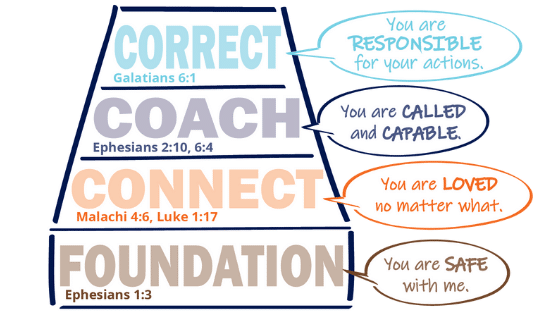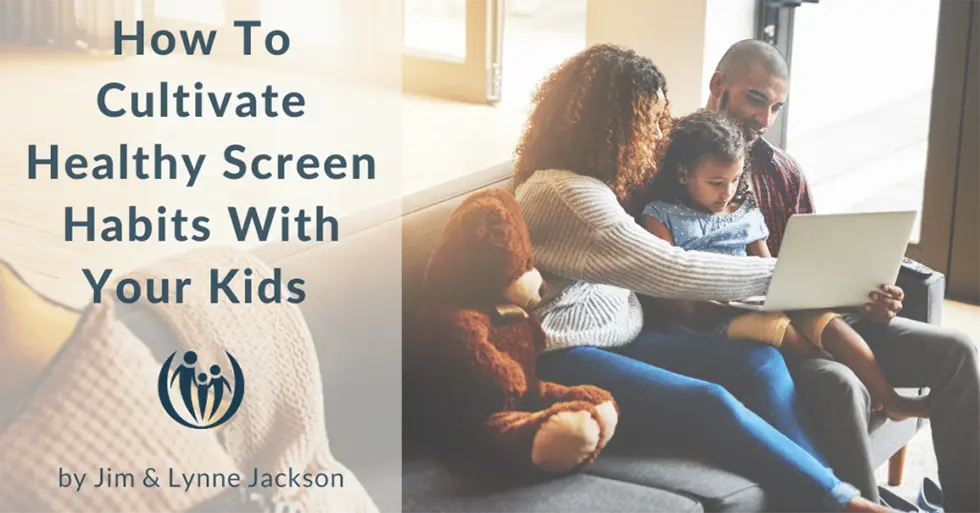By: Jim & Lynne Jackson
From: connectedfamilies.org
Does World War III break out over screen time in your home? You are not alone. Most parents struggle to find this elusive idea of healthy screen time. We know our kids are growing up in the 21st century and need to know how to use technology, but it’s a double-edged sword. As soon as a child tastes their first exposure to screen time, it seems like there’s never enough. And nothing about screen time feels healthy again…
Or, at least, it doesn’t for a lot of families.
The fact is, cultivating healthy screen habits in kids (or adults) is not easy. This continues to be one of the most common struggles we hear about from parents.
Your kids are on a screen for school. Or when you try to occupy them during your conference call. Or when you take a shower. Or maybe because you need to have a conversation with your spouse.
So, how can you guide your kids toward a healthy use of screen time?
Let’s be honest: kids don’t naturally exhibit self-control when it comes to screens. But probably a lot of us don’t either.
Parents often tend to randomly vacillate between high control because they have concerns about their child’s screen use and leniency because they just don’t want to fight anymore. Is it possible to find a balance?
First, what are healthy screen habits?

That’s easier asked than answered. In some ways, it’s easier to start by identifying unhealthy screen habits.
Relationships (we’ll get into why later on) play a big factor in how healthy or unhealthy a screen habit is. Think of these two scenarios:
- Watching a movie with family for two hours
- Playing a single-player video game alone in your room for two hours
Neither is intrinsically good or bad, but they are quite different experiences, aren’t they?
Signs of too much screen time (and even screen addiction!)
There are certain habits that are more closely associated with screen addiction. (Yes, screen addiction is real.)
In fact, in research looking at children ages 4-11, Dr. Sarah Domoff and her colleagues found certain behaviors indicative of a problem. Children with the behaviors listed below were more likely to develop screen addictions later in life.
These are the nine factors considered in the Problematic Media Use Measure:
- Unsuccessful control. It’s hard for your child to stop using screen media.
- Loss of interest. Screen media is the only thing that seems to motivate your child.
- Preoccupation. Screen media is all your child seems to think about.
- Psychosocial consequences. Your child’s screen media use interferes with family activities.
- Serious problems due to use. Your child’s screen media use causes problems for the family.
- Withdrawal. Your child becomes frustrated when he/she cannot use screen media.
- Tolerance. The amount of time your child wants to use screen media keeps increasing.
- Deception. Your child tries to hide their screen media use or access it without your knowledge.
- Escape. When your child has a bad day, screen media seems to be the only thing that helps him/her feel better.
Basically, any habit that leads to the above nine factors is an unhealthy screen habit. The more of these nine factors you see in your kids, the more serious the problem.
Now, it’s important to note the time spent on screens is not on the list. Because, again, different screen activities are not equal.
Read about one child’s Minecraft addiction
What does this look like in real life? Read about how one family navigated their son’s pretty serious Minecraft addiction in our article, “What Do You Do with a Minecraft Addiction?“
But all screen time is unhealthy screen time, right?
Not quite.
While there has been a lot of media coverage of the very real problems and concerns with technology, that’s not the full story.
Yes, tech giants are having their kids opt out of tech-rich lifestyles. That’s worth noting.
Other articles suggest smartphones have “destroyed a generation,” citing depression, anxiety, and suicide rates.
But real studies on teens with phones are more mixed. In fact, if you want to get deep into it, here’s a great study about teens and phones.
But no matter the research, it’s not as much about time on the phone or playing games. It’s a lot about the type and quality of screen time.
And mentorship and wisdom.
You, as the parent, have the honor of mentoring your child into healthy screen habits.
Growing healthy screen habits takes time
Let’s reverse the Problematic Media Usage list. Rather than focusing on what is unhealthy, let’s focus on what healthy screen habits might look like:
- Controllable
- Your child can use a screen and get off a screen peacefully, as they need to.
- Limited
- There are many other activities in your child’s life that interest them. Screen time is just one thing, and it has a set time and place.
- Your child talks with enthusiasm about non-screen related activities.
- When they’re having a bad day, sometimes they might ask for screen time, but many times they look for cuddles, conversation, or fun outdoor activities.
- Purposeful
- Screen time is usually purposeful and harnessed for good. Not only is it not causing social problems, but it’s adding value to the world or strengthening relationships.
- Sometimes you and your child watch something together for bonding.
- Maybe your child is participating in a digital talent show, participating in an online fundraiser, creating engaging content for shut-in older relatives, or building a website to help with a problem they see.
- Out in the open
- There’s nothing to hide, and there’s no opportunity to hide either.
There is no formula here. Moreover, it’s not our place to tell you what your family’s screen rules should be or what boundaries you should set around the screens in your home.
The goal is to cultivate healthy screen habits. Given that, it makes sense to evaluate any family screen rules based on what’s healthy. It makes sense to keep these four indicators of health in mind while making rules. Of course, that’ll look different in each family and during each phase of life.
Our goal is to help you approach whatever your family’s rules are in a way that deepens your connection to your children while growing your children in wisdom.
Start with the Framework, for screens too
We approach parenting struggles from the Connected Families Framework of connect, coach, and correct from a foundation of safety.Always.

When you discipline or teach a child, the messages you may be sending can become their identity. We always want to make sure those messages are:
- You are safe.
- You are loved.
- You are called and capable.
- You are responsible.
(If you are not familiar with the Connected Families Framework, watch the three-minute video on this page.)
You might be asking the question: but HOW do I teach healthy screen habits?
Wouldn’t it be nice if there was a formula, or just a series of steps, to tackle this tough issue of screen rules? The truth is… there is no formula. The key is to have parents and kids working together toward a clear vision for your family.
For that, let’s use the Framework.
FOUNDATION: You are safe with me, even if glued to the screen
A solid foundation for parenting is built on God’s grace and truth for you and your kids. When you receive and pass on that grace and truth, it enables you to be a safe person to your child, regardless of their behavior. Some practical questions that guide “foundation thinking” are:
- What’s going on in me about this issue?
- What’s it like to be my child?
- What is God’s grace and truth for both of us?
Thoughtful consideration of these questions helps lay a strong foundation of safety in the relationship.
Ask, “What’s going on in me?”
In this podcast, we discussed how my (Lynne’s) own anxiety increased the tension between our teenage son and me. When I stopped and asked myself, “What is going on with me?” I noticed I felt more anxious when he was playing video games compared to whenever he was doing something else. Moreover, he was sensing that anxiety when it was time for him to get off the screen, and it aggravated our conflict.
I also became aware of negative judgments I had formed in my own mind about him: that he was lazy and lacked self-control. Kids can often sense these kinds of judgments, and they can be an internal voice about who they are.
When we realize we have judgments about our child, it’s helpful to ask ourselves, “What is the truth about my child from God’s perspective?”
We can reframe our beliefs about our kids to be in line with God’s grace and truth:
- My child was made for God’s good purposes.
- My child is called and capable.
This perspective guides us toward much better interaction with our kids because we aren’t throwing all our own negative baggage into the situation. Anchoring in God’s grace and truth helps us relax, do less managing of behavior, and do more motivating toward creative, purposeful activities that are a fit for our child’s gifting.
Consider what it’s like to be your child struggling with screen time
The second helpful question parents can ask themselves is, “What’s it like to be my child in this situation?”
Whether your child is glued to a Daniel Tiger marathon, Fortnite with friends, or a TikTok session, the challenge for kids and their brains is SO much more than we might anticipate! It helps us to have compassion for our kids when we understand the intensity of what we are up against when we ask a child to end their screen time.
Remember the movie “Big”? There is a line from the movie that accurately describes the motivation of video game companies: “If we can get them to put the first quarter in, they’ll never stop!” Clearly, that has been successful!
Understanding the addictive nature of screens in general, and specifically what is happening in your child’s brain chemistry when they are on screens, is vitally important. It will help you have compassion and be prepared, not surprised, about what might happen when it’s time for kids to get off a screen. It’s really hard for kids and adults to engage in healthy screen time!
How To Cultivate Healthy Screen Habits with Your Kids
By: Jim & Lynne Jackson From: connectedfamilies.org
Other Ways to Connect
We hope you enjoyed these ideas. Do you have any thoughts on how to cultivate healthy screen habits with your kids? Please connect with us on Facebook and Instagram and let us know! If you would like to learn more about upcoming events, sign up to receive our quarterly newsletter here. Check out some of our other blog posts here, for tips and tricks for single parents, budget hacks, inspiration and more information about what we do here at SPARC Hope.

